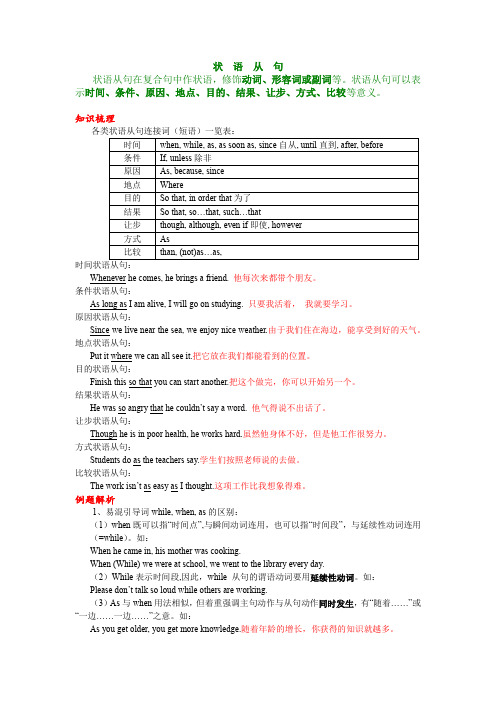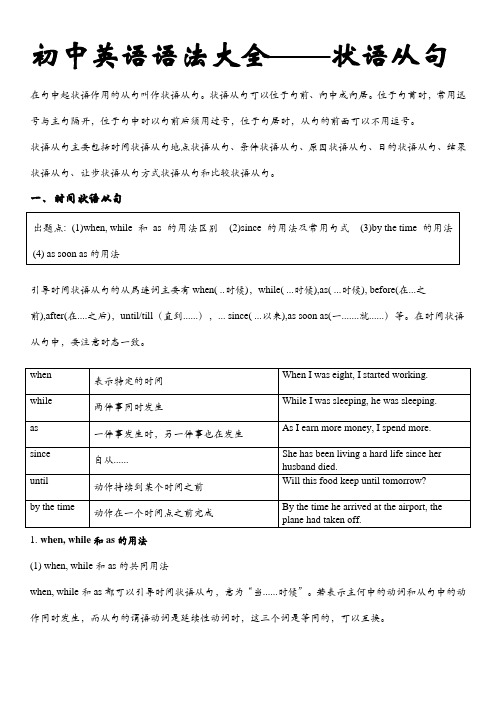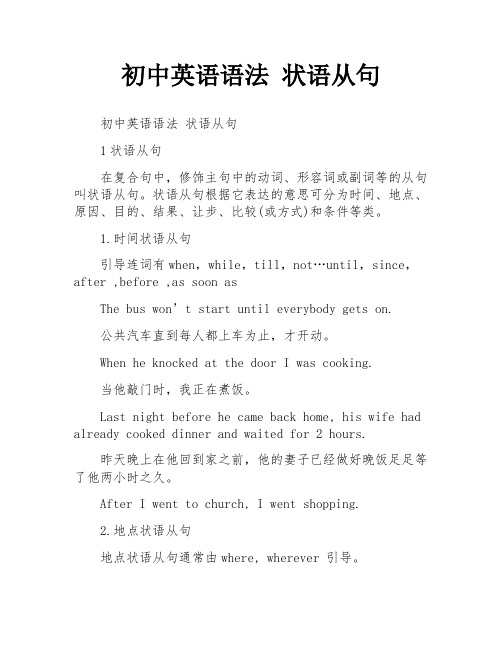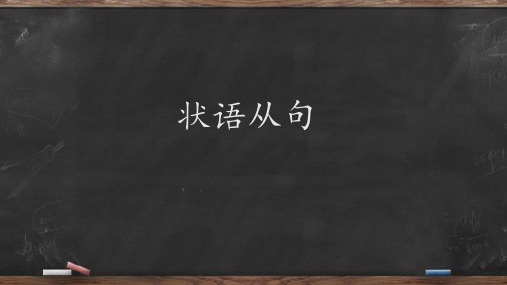初中英语语法状语从句-精华版
初中英语状语从句整理必背-多个例句强化规律

初中英语状语从句整理必背-多个例句强化规律以下是常考的9种状语从句及其常用的连词,每个连词后面列出了三个例句及其翻译,熟练背诵有助于理解长难句和写作提高拿高分或满分,同时综合填空等填空题型时态把握也有很大帮助,语言习得,只有通过多个例子强化练习,感悟才能达到孰能生巧的程度,加油,相信你能够成就最好自己。
时间状语从句常用连词:when, while, as, before, after, since, until(1)when: 当...时候,无论何时例句:When I was young, I liked to play with my friends. (当我年轻的时候,我喜欢和朋友们一起玩。
)When we have finished our work, we can go home. (当我们完成工作后,我们可以回家。
)When she sings, she sounds beautiful. (当她唱歌时,她的声音听起来很美。
)(2)while: 与...同时,当...时候例句:While I was cooking, my sister was watching TV. (当我烹饪的时候,我的妹妹在看电视。
)While we were waiting for the bus, we saw a dog on the street. (当我们等公交车的时候,我们在街上看到了一只狗。
)While she was writing her exam, she suddenly remembered something important. (当她在写考试的时候,她突然想起了重要的事情。
) (3)as: 当...时候,一边...一边...例句:As I was walking to school, I saw a cat chasing a bird. (当我步行去学校的时候,我看到了一只猫在追一只鸟。
初中英语语法状语从句(精讲)

状语从句状语从句在复合句中作状语,修饰动词、形容词或副词等。
状语从句可以表示时间、条件、原因、地点、目的、结果、让步、方式、比较等意义。
知识梳理时间状语从句:Whenever he comes, he brings a friend. 他每次来都带个朋友。
条件状语从句:As long as I am alive, I will go on studying. 只要我活着,我就要学习。
原因状语从句:Since we live near the sea, we enjoy nice weather.由于我们住在海边,能享受到好的天气。
地点状语从句:Put it where we can all see it.把它放在我们都能看到的位置。
目的状语从句:Finish this so that you can start another.把这个做完,你可以开始另一个。
结果状语从句:He was so angry that he couldn’t say a word. 他气得说不出话了。
让步状语从句:Though he is in poor health, he works hard.虽然他身体不好,但是他工作很努力。
方式状语从句:Students do as the teachers say.学生们按照老师说的去做。
比较状语从句:The work isn’t as easy as I thought.这项工作比我想象得难。
例题解析1、易混引导词while, when, as的区别:(1)when既可以指“时间点”,与瞬间动词连用,也可以指“时间段”,与延续性动词连用(=while)。
如:When he came in, his mother was cooking.When (While) we were at school, we went to the library every day.(2)While表示时间段,因此,while 从句的谓语动词要用延续性动词。
(完整版)状语从句知识点大全

(完整版)状语从句知识点大全状语从句是一个句子做另一个句子的状语,用于描述、限制、补充或解释主句的动作或状态。
在英语语法中,状语从句非常常见且广泛应用。
以下是状语从句的一些常见知识点:1. 时间状语从句(Time Adverbial Clauses):用来表示时间,常用的引导词有when, while, as, before, after, until, since等。
例如:I will call you when I arrive home.翻译:我到家时会打电话给你。
2. 地点状语从句(Place Adverbial Clauses):用来表示地点,常用的引导词有where, wherever等。
例如:She can't find her keys anywhere.翻译:她无论到哪儿都找不到她的钥匙。
3. 原因状语从句(Cause Adverbial Clauses):用来表示原因,常用的引导词有because, since, as, for等。
例如:I didn't go to the party because I was tired.翻译:因为我累了,所以我没有去参加聚会。
4. 结果状语从句(Result Adverbial Clauses):用来表示结果,常用的引导词有so, therefore, thus等。
例如:He studied hard, so he passed the exam.翻译:他努力研究,所以他通过了考试。
5. 条件状语从句(Condition Adverbial Clauses):用来表示条件,常用的引导词有if, unless, provided that等。
例如:If it rains tomorrow, we won't go to the park.翻译:如果明天下雨,我们不会去公园。
6. 目的状语从句(Purpose Adverbial Clauses):用来表示目的,常用的引导词有so that, in order that等。
(完整版)中考英语状语从句考点归纳与例析

中考英语状语从句考点归纳与例析【重点讲解】中考英语试题对状语从句的考查主要涉及引导状语从句的从属连词的用法。
单项选择题的四个选项往往是四个连词,这是状语从句最常见的考查形式。
另一个考点是状语从句中的时态,因此,在学习状语从句时要弄清状语从句的几个主要类别,如时间、地点、原因、条件、让步、方式、目的、结果等,同时记住它们的“引导词”及其相关意义。
考点一:引导状语从句的连词的选择。
1、引导时间状语从句的连词主要有when, while, as, by the time, before, after, since, till/until, as soon as等。
其中when,while和as都可表示"当……时候",但用法有区别:when意为"在……时;当……时",可表示"点时间"或"段时间",从句谓语可以是终止性动词,也可以是延续性动词。
例如:When I got home, he was having supper.as意为"边……边……"或"与……同时",重在表示两个动作同时发生。
伴随进行。
as从句是终止性动词时,主句通常也必须是终止性动词。
例如: They sang as they danced.while只可表示"段时间",从句谓语只限于延续性动词。
例如:While I was sleeping, my father came in.注意:从句谓语是持续性动词时,when,while和as可以互换。
主、从句谓语都是终止性动词时,when与as可互换。
从句谓语表示状态时,通常用while。
2、引导地点状语从句的常用连词是where。
例如:Where there is a will there ia a way.3、引导原因状语从句的连接词主要有because, as, since, for。
初中英语语法大全——状语从句

初中英语语法大全——状语从句在句中起状语作用的从句叫作状语从句。
状语从句可以位于句前、向中成向居。
位于句首时,常用迅号与主句隔开,位于句中时以句前后须用过号,位于句居时,从句的前面可以不用逗号。
状语从句主要包括时间状语从句地点状语从句、条件状语从句、原因状语从句、目的状语从句、结果状语从句、让步状语从句方式状语从句和比较状语从句。
一、时间状语从句引导时间状语从句的从属连词主要有when( ..时候),while( ...时候),as( ...时候), before(在...之前),after(在....之后),until/till(直到......),... since( ...以来),as soon as(一.......就......)等。
在时间状语从句中,要注意时态一致。
1.when, while和as的用法(1) when, while和as的共同用法when, while和as都可以引导时间状语从句,意为“当......时候”。
若表示主何中的动词和从句中的动作同时发生,而从句的谓语动词是延续性动词时,这三个词是等同的,可以互换。
eg: When/While/As we were dancing, a stranger came in. 当我们跳舞的时候,一个陌生人进来了。
eg: When/While/As I was taking a bath, the telephone rang. 我在洗澡的时候,电话响了。
(2) when, while和as的用法区别①when引导的时间状语从句的谓语动词既可以是延续性的,也可以是非延续性的,而while引导的时间状语从句的谓语动词只能是延续性的。
eg: When you came in, I was talking with a few boys. 你进来时,我正在和几个男孩子谈话。
eg: While we were waiting for the bus, it was raining heavily. 我们等公交车时,天正下着大雨。
初中英语语法 状语从句

初中英语语法状语从句初中英语语法状语从句1状语从句在复合句中,修饰主句中的动词、形容词或副词等的从句叫状语从句。
状语从句根据它表达的意思可分为时间、地点、原因、目的、结果、让步、比较(或方式)和条件等类。
1.时间状语从句引导连词有when,while,till,not…until,since,after ,before ,as soon asThe bus won’t start until everybody gets on.公共汽车直到每人都上车为止,才开动。
When he knocked at the door I was cooking.当他敲门时,我正在煮饭。
Last night before he came back home, his wife had already cooked dinner and waited for 2 hours.昨天晚上在他回到家之前,他的妻子已经做好晚饭足足等了他两小时之久。
After I went to church, I went shopping.2.地点状语从句地点状语从句通常由where, wherever 引导。
Where there is a will, there is a way. 哪里有志向,哪里就有出路。
有志者事竟成。
Where there is a life, there is a hope. 哪里有生命,哪里就有希望。
留得青山在,不怕没柴烧。
Wherever you go, whatever you do, I will be right here waiting for you.不管你去哪里,不管你做什么,我都会在此守侯你。
3.原因状语从句引导连词有because,as, since。
He didn′t see the film because he had seen it.他没有看那部电影,因为他已经看过了。
They couldn’t get on the train,for it was too crowed.比较:because, since, as和for1)because语势最强,用来说明人所不知的原因,回答why提出的问题。
初中英语语法公式状语从句

初中英语语法公式状语从句在初中英语中,状语从句是一种非常常见的句子结构,用来修饰句子的谓语动词,增加句子的信息和意义。
以下是几种常见的初中英语语法公式状语从句:1. 时间状语从句(Time Adverbial Clause):- when(当...时候):I will go to the park when I finish my homework.- while(当...时候):He reads a book while he is waiting for the bus.- before(在...之前):Please finish your dinner before you watch TV.- after(在...之后):I usually clean my room after I have breakfast.2. 地点状语从句(Place Adverbial Clause):- where(在...的地方):She can sit wherever she likes.- wherever(无论在哪里):You can find him wherever he goes.3. 原因状语从句(Reason Adverbial Clause):- because(因为):He stayed at home because it was raining outside.- since(因为):She didn't go to the party since she was not feeling well.4. 条件状语从句(Conditional Adverbial Clause):- if(如果):If it rains tomorrow, we will stay at home.- unless(除非):You can't go outside unless you finish your homework.5. 方式状语从句(Manner Adverbial Clause):- as(如同):She ran as fast as she could.- like(像):He dances like a professional.这些状语从句的使用可以丰富句子的表达,使句子更加清晰明了。
初中英语语法大全之状语从句专项讲解

2、地点状语从句
常用引导词:where 例句 Generally, air will be heavily polluted where there are factories.
3、原因状语从句
常用引导词:because, since, as, for 例句 My friends dislike me because I'm handsome and successful.
To such an degree was he excited that he couldn't sleep last night.
6、条件状语从句
常用引导词: if, unless 例句 We‘ll start our project if the president agrees.
7、让步状语从句
when
既可以表示在某一点的时候,又可表示在某一段时间内。
when可以和延续性动词连用,也可以和短暂性动词连用;而 while 和 as只能和延续性动词连用 ;
when从句的谓语动词可以在主句谓语动作之前、之后或同时 发生;while和as从句的谓语动作必须是和主句谓语动作同时
发生。
When we were at school, we went to the library every day. (在一段时间内)
,when,while,as都可使用。 主句中的动作或事情是在从句中的动作或事情的进展过程中
发生,从句中的动词一般要用延续性动词。
When /While /As we were dancing,a stranger came in. (dance为延续性动词)
Please don’t talk so loud while others are working.
- 1、下载文档前请自行甄别文档内容的完整性,平台不提供额外的编辑、内容补充、找答案等附加服务。
- 2、"仅部分预览"的文档,不可在线预览部分如存在完整性等问题,可反馈申请退款(可完整预览的文档不适用该条件!)。
- 3、如文档侵犯您的权益,请联系客服反馈,我们会尽快为您处理(人工客服工作时间:9:00-18:30)。
状语从句状语从句用来修饰主句中的动词,副词和形容词的从句叫状语从句。
根据其含义状语从句可分为时间状语从句,地点状语从句,条件状语从句,原因状语从句,结果状语从句,比较状语从句,目的状语从句,让步状语从句。
1. 时间状语从句(1)时间状语从句常用when, as, while, before, after, since, till, until, as soon as等连词来引导。
例如:When while as 的区别It was raining hard(rain hard 下大雨)when got to school yesterday.While he was doing his homework, the telephone rang.As he walked along(沿着走)the lake, he sang happily.He had learned a little Chinese before he came to China.After he finished middle school, he went to work in a factory.(2)在时间状语从句里,通常不用将来时态,用现在时态表示将来的动作或状态。
例如:I’ll ring you up as soon as I get to New York.I will tell him everything when he comes back.He won’t believe it until he sees it with his own eyes.(3)在带有till或until引导的时间状语从句的主从复合句里如果主句用肯定式,其含义是“一直到……时”,谓语动词只能用延续性动词。
如果主句用否定式,其含义是“直到……才……”, “在……以前不……”, 谓语动词可用瞬间动词。
例如:The young man read till the light went out(熄灭).Let’s wait until the rain stops.We won’t start until Bob comes.Don’t get off(从下来)until the bus stops.【。
固定组合里from morning till night,till/until是不能替换的,】2. 条件状语从句(1)条件状语从句通常由if, unless引导。
例如:What shall we do if it snows tomorrow?Don’t leave the building unless I tell you to.(2)在条件状语从句里,谓语动词通常用现在时态表示将来的动作或状态。
例如:I’ll help you with your English if am free tomorrow.He won’t be late unless he is ill.(3)“祈使句+ and (or)+ 陈述句” 在意思上相当于一个带有条件状语从句的复合句。
例如:Hurry up, or you’ll be late. =If you don’t hurry up, you’ll be late.Study hard and you will pass the exam. =If you study hard, you will pass the exam.3. 原因状语从句(1)原因状语从句通常由because, since, as引导。
例如:He didn’t come to school because he was ill.As it is raining, we shall not (不得;不应该)go the zoo.Since you can’t answer the question, I’ll ask someone else.(2) bcause since as forbecause表示直接原因,语气最强。
Because引导的原因状语从句多放在主句之后。
回答由why提出的问题,只能用because。
As和since语气较弱,一般用来表示明显的原因。
由as和since引导的原因状语从居多放在句首。
for并列连词,正式,例如:------Why aren’t going there?------Because I don’t want to.As he has no car, he can’t get there easily.Since we have no money, we can’t buy it.(3)because和so不能同用在一个句子里。
4. 结果状语从句(1)结果状语从句由so…that, such…that, so that引导。
例如:He is so poor that he can’t buy a bike for his son.She is such a good teacher that everybody likes her.My pencil fell under the desk, so that I couldn’t see it.(2)so…that语such...that可以互换。
例如:在由so...that引导的结果状语从句中,so是副词,与形容词连用。
其结构是: “...so + 形容词(副词)+ that + 从句”。
例如:He was so glad that he couldn’t say a word.The hall is so big that it can hold 2,000 people.Mother lives so far away that we hardly ever(几乎不,从来不)see her.在由such…that引导的结果状语从句中,such是形容词,它修饰的可以是单数或复数可数名词,也可以是不可数名词;名词前面可以带形容词,也可不带。
如果是单数可数名词,前面需加不定冠词a或an。
例如:It was such a hot day that nobody wanted to do anything.He had such long arms that he could almost touch the ceiling.(天花板)He made such rapid progress that he did very well in the mid-term.有时上述两种结构是可以互换的。
例如:It was such a wonderful film that all of us wanted to see it again.=The film was so wonderful that all of us wanted to see it again.It is such an important match that nobody wants to miss it.=The match is so important that nobody wants to miss it.*(3)如果名词前由many, much, little, few等词修饰时,只能用so, 不用such。
例如:Soon there were so many deer that they ate up all the wild roses.He has so little time that he can’t go to the cinema(去看电影)with you.5. 比较状语从句比较状语从句通常由as+原级…as, 比较级+ than…等连词引导。
例如:Tom runs faster than John does.This classroom is as big as that one.6. 目的状语从句(1)目的状语从句通常由so that, in order that(为了,以便)引导。
例如:We started early so that we could catch the first train.He studies hard so that he could work better in the future.We used the computer in order that we might save time.(2)so that既可引导目的状语从句,又可引导结果状语从句。
区别这两种从句的办法有两个:1)目的状语从句里往往带有情态动词can, could, may, might等。
2)从意思上看,目的状语从句往往表示的目的很明确。
例如:Speak clearly so that they may understand you. (目的状语从句)Jack is badly ill so that he has to rest. (结果状语从句)7. 让步状语从句(1)让步状语从句通常由although, though等连词引导。
例如:Though he is young, he knows a lot.Although I am tired, I must go on working.(2)although(though)不能和but用在同一个句子中。
yet可以。
例如:我们不能说:Though it was raining hard, but he still went out.应该说:Though it was raining hard, he still went out.或It was raining hard, but he still went out.8. 地点状语从句地点状语从句常常由where来引导。
例如:Go where you like.Where there is a will, there is a way.总结:状语从句分类及常用连词:类别连词时间状语从句when, whenever, while, as, before, after, since, till, once(一旦)地点状语从句where, wherever原因状语从句because, since, as, for, now that(既然,由于)etc. (et cetera,等于and so on)目的状语从句in order that(为了,以便), so that, that, etc.结果状语从句so…that, so that, such…that, that, etc.条件状语从句if, unless, as(so)long as, etc.让步状语从句though, although, even if, even though, however, whatever, as, etc.比较状语从句as…as, so…as, than, etc.方式状语从句as, as if, as though, etc.例题解析:举一反三,学的更轻松!2.though/although ---Yet3.巩固练习:熟能生巧,取得好成绩!能力提高练习1U( ) 1 The meeting didn't start___ everyone was there.A. becauseB. untilC. whyD. if( ) 2 The boy ___ to bed ___ his mother came in.A. went not; untilB. didn't go; afterC. went; untilD. didn't go; until ( ) 3 I won't believe you___ I have seen it with my own eyes.A. beforeB. untilC. afterD. when( ) 4 He ___ home ___ she was satisfied ___ his answer yesterday.A. didn't go; until; withB. wasn't go; after; toC. doesn't go; before; withD. didn't go; until; to( ) 5 He ___ back until the work ___ done.A. isn't; will beB. isn't; isC. won't be; will beD. won't be; is ( ) 6 They didn't start the work ___ their teacher came back.A. untilB. whileC. as soon asD. if2 SJ( ) 1 Tom will call me as soon as he ___ Shanghai.A. arrivesB. will reachC. arrives inD. get to( ) 2 I'm sure he'll come to see me before he ___ Beijing.A. will leaveB. is leavingC. leaveD. leaves( ) 3 I will tell him the news as soon as he___ back.A. comeB. comesC. will comeD. came3 ST 一般过去/过完/现完( ) 1 Tom has got a watch. He ___ it for two years. It _______ by his father.A. has bought; was boughtB. has got; is bought ,C. was bought; has boughtD. has had; was bought "'( ) 2 When he got to the station, the train ___.A. leftB. had leftC. leavesD. has left( ) 3 The boy told his father what he ___ in the street.A. sawB. have seenC. had seenD. see( ) 4 We ___ TV when the telephone ____.A. watched; was ringingB.were watching; rangC. watch; ringsD. are watching; rang( ) 5 By the end of last term, I___ ten books.A. had finished readingB. have finish readingC. had finish to readD. finish read4S since /for( ) 1 I ___ you for a long time. Where ___ you ___?A. didn't see; did; goB. didn't see; have; goneC. haven't seen; have; beenD. haven't seen; have; gone( ) 2 Tom___ China for 3 years.A. has beenB. has been inC. has been toD. has been at( ) 3 I won't go to see the film tonight, because I ___ my ticket.A. lostB. have lostC. will loseD. didn't lose( ) 4 -Hello! May I speak to Bob?-Sorry, but he ___ for a month.A. had been awayB. was leftC. leftD. has been away( ) 5 I ___ him since I began to live in the city.A. knowB. have knownC. knewD. will know( ) 6 Zhao Lan ___ already ___ in this school for two years.A. was; studyingB. will; studyC. has; studiedD. are; studying5Y( ) 1 Betty didn't go to see the film yesterday ___ she was ill.A. becauseB. butC. untilD. if=( ) 2 May I sit nearer___I can see more clearly?A. as ifB. so thatC. even ifD. so( ) 3 ___ you work hard, you will certainly succeed.A. ThoughB. IfC. BecauseD. For( ) 4 ___ he came to study in the university, he has made much progress in the study of English.A. WhileB. WhenC. SinceD. After( ) 5 I'd like to go swimming _____ the water is not too cold.A. forB. unlessC. ifD. whether6B( ) 1 There are ___ many league members in class 2 ___ in Class 4.A. both; andB. 'so; thatC. either; orD. as; as( ) 2 -Do you have a big library?-No, we don't. At least, not___yours.A. as big asB. as big thanC. as bigger thanD. bigger as( ) 3 Suzhou is not ____ beautiful ____ Hangzhou.A. as; thanB. so; asC. even; thanD. /; than( ) 4 Iron is more useful ___ any other metal.A. asB. thanC. thenD. so7T( ) 1 I want to know ___ she is going to see a film.A. ifB. thatC. whatD. which( ) 2 You are sure to pass the exam ___ you study hard.A. ifB. thoughC. thatD. since( ) 3 I'll go to see the film with you___I have time this evening.A. whetherB. soC. ifD. when( ) 4 ___ you study harder, you'll never pass the final exam.A. IfB. UntilC. UnlessD. Except8R( ) 1 Although it was raining,____ still worked in the fields.A. but theyB. and theyC. theyD. and yet they( ) 2 ___ there were only five soldiers left at the front, ___ they went on fighting.A. Because; soB. If; andC. Though; butD. Though; /( ) 3 ___ she is very old, ___ she can still work eight hours a day.A. Because; soB. Though; butC. As; yetD. Though; yet9M( ) 1 Please answer the question in a loud enough voice ___ all the class may hear.A. so, thatB. orC. in order thatD. and( ) 2 Lift it up___I may see it.A. thoughB. so thatC. asD. than( ) 3 I hurried___I wouldn't be late for class.A. soB. so thatC. ifD. unless( ) 4 We should go by bus ___ we can get there earlier.A. as soon asB. whereC. in order thatD. as10J( ) 1 The dictionary is so expensive ___ I can't buy it.A. becauseB. whenC. thatD. if( ) 2 I got there ___ late ___ I didn't see him.A. too; toB. such; thatC. so; thatD. so; as( ) 3 It is ___ hot in the room ___ we have to go out for a walk.A. such; thatB. so; thatC. as; asD. such; as( ) 4 He has___ an interesting book that we want to read it.A. soB. suchC. the sameD. as2012年全国各地中考英语真题分类汇编—状语从句1. We'll go for a picnic if it ________ this Sunday.— Wish you a lovely weekend.A. rainB. doesn't rainC. won't rain2. Teresa is ________ nervous ________ she can't talk in front of the class.A. such, thatB. too, toC. so, that3. -- What's your plan for the summer holidays?--I'll go to Beijing_____ the school term ends.A. in order thatB. so thatC. as soon asD. even though5.I think _____ not difficult _____ English every morning.A. that; keep reading Bit's; keep readingC. that; to keep readingD.it; to keep reading7. There will be a flower show in the park________ we visited last week.A. whoB. whenC. whatD. which8. — If our government _____attention to controlling food safety now, our health _____in danger.A. won't pay, isB. doesn't pay, isC. won't pay, will beD. doesn't pay, will be9. —Excuse me. Could you wake me up when my friend____ here?—Of course. But we still don't know when your friend _____ here.A. comes; will comeB. comes;comesC. will come; comesD. will come;will come10. —Do you have Jay's CDs?—Sorry, they are _____. But we'll get some more next week because they _____.A. sold well;are on saleB. sold out;sell wellC. selling well; sell wellD. for sale; sell well11. —Why is Harvey's mother so happy?—Because only three students _____, _____ his son Harvey.A. failed the exam; besidesB. made progress; exceptC. made progress; includingD. passed the exam; without12. —I want to know when Mr. Brown will arrive.—When he ________ , I will tell you.A. will arriveB. arrivedC. arrives13. —I like drinking wine. But people who drink wine aren't allowed to drive.—If I ________ you, I would give up ________ wine.A. were; drinkingB. am; drinkingC. were; drinkD. was; to drink14. ________ I was in the US, I made a lot of American friends.A. WhileB. AlthoughC. UnlessD. Until15. What would happen if he ______ back home?A. goB. goesC. went16. If a polar bear _____, it _____fish from the water.A. will be hungry; catchesB. is hungry; will catchC. is going to be hungry; catchesD. is hungry; won't catch17. We will go for a picnic if it _______tomorrow.A. doesn't rainB. wasn't rainyC. won't rainD. wasn't raining18.-Do you know if we will go for a picnic this Saturday?-I think we will if we ________ any classes.A. won ' t haveB. didn't' t haveC. don't haveD. aren ' t having19.The bus driver always says to us ,“Don't get off________ the bus stops.”A. whenB. while C .until D. if20. – Excuse me, can I interview Mr. Miller this afternoon?-- A moment, please. Let me check ______ .A. if Mr. Miller will be freeB. when will Mr. Miller have timeC. if Mr. Miller had an appointmentD. when does Mr. Miller come back21. ________ he has little knowledge, the old worker has a lot of experience.A. Although.B. Because.C. If22. —Do you have any problems if you ________ five minutes to read?—Well, I'm thinking about the new words. There are too many.A. giveB. are givenC. will be given能力提高练习参考答案:1. 1-6 B D B A D A2. 1-3 C D B3. 1-5 D B C B A4. 1-6 C B B D B C5. 1-5 A B B C C6. 1-4 D A B B7. 1-4 A A C C8. 1-3 C D D9. 1-4 C B B C10. 1-4 C C B B中考真题1【答案】B【解析】选B。
